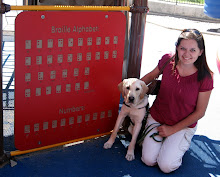This year in English class you are going to have a unique opportunity. I am a volunteer puppy raiser for Guide Dogs for the Blind. My responsibilities as a volunteer include teaching puppies basic obedience and socializing them by taking them everywhere I go. That means I will be bringing a puppy to school with me every day.
Right now I am raising my third puppy Kyle. He is a nine-month-old, male, yellow Labrador. Kyle is an extremely well behaved dog. He knows most of his basic commands and understands how to behave in public. His size makes him look almost like an adult dog, but he is still very much a puppy. Kyle will be with me for about six more months. During this time, Kyle’s primary task will be to cement all of the skills he has learned over the past few months.
Kyle will probably return to Guide Dogs for the Blind campus for formal training in early spring. That means I will most likely be bringing another, much younger, puppy with me for the last few months of school. Also, I occasionally will bring other puppies from my club with me while Kyle spends time in other raiser’s homes. The purpose of puppy trades is to expose puppies-in-training to as many situations as possible.
I need the help of all of my students to properly train Kyle for his future work as a guide dog. Your job is simple. I need you to completely ignore Kyle. Puppies naturally know they are adorable and seek attention. They need to know that in public the only person that will pay them attention is their raiser. This helps the puppies focus on their work and bond with their handlers. Thus, as hard as it may be, please ignore Kyle during the school day.
If we all do our parts, Kyle will sleep or play quietly behind my desk, and we’ll forget he is even in the room. That way, you will be able to learn English, and Kyle can learn to be a guide dog at the same time.
Guide Dog Puppy Etiquette
- As tempting as it may be to pet a guide dog in training, remember that this puppy will be responsible for leading someone who is visually impaired. The puppy should never be distracted from his or her duty. A person’s safety will depend on their dog’s alertness and concentration.
- At times, it is okay to ask someone if you may pet their guide dog puppy. Use prudent judgment before asking. Many people enjoy introducing their puppies when they have the time. The puppy’s primary responsibility is to its partner, and it is important that the puppy not become solicitous.
- A guide dog puppy should never be offered food or other distracting treats. Puppies are fed on a schedule and follow a specific diet in order to keep them in optimum condition. Even slight deviations from their routine can disrupt their regular eating and relieving schedules and seriously inconvenience their raisers. Guide dog puppies are trained to resist offers of food so that they will be able to visit restaurants without begging. Feeding treats to a puppy-in-training weakens this training.
- It’s not all work and no play for guide dogs in training. When they are not in their puppy vests, they are treated in much the same way as pets. However, for their safety they are only allowed to play with specific toys. Please don’t offer them toys without first asking their raiser’s permission.
- A guide dog puppy can make mistakes and must be corrected in order to maintain its training. This correction usually involves a verbal admonishment coupled with a leash correction, followed by praise when the dog regains focus and correctly follows a command. Guide dog puppy raisers have been taught the appropriate correction methods to use with their dogs.
- Access laws, including the Americans with Disabilities Act and the Utah Human Services Code, permit people who are training future guide dogs anywhere the general public is allowed, including taxis and buses, restaurants, theaters, stores, schools, hotels, apartment and office buildings.
- Before asking a question of a person handling a dog, allow them to complete the task at hand.
- Remain calm in your approach and mannerisms. If you act excited or anxious, a puppy will mirror your emotions.
- Never tease a puppy-in-training. It is extremely important for puppies’ socialization that they learn to trust all humans, not just their raisers.
- When you see a puppy-in-training you know, refrain from calling out his or her name. Doing this could cause a puppy to become distracted when working.




Very Nice! Good job - I normally try to not tell my classmates Bob's name just because I have had friends come up and say "Hi BOB!" and he goes crazy but I'm sure your kids will figure out pretty quickly what Kyle's name is anyways so I guess my whole comment is useless haha.. Either way good luck with with your kids this year!!
ReplyDeleteVery good! I hope Kyle loves all the school peoples!
ReplyDeleteI'm excited to hear how Kyle does! I'm sure he'll do great!
ReplyDelete